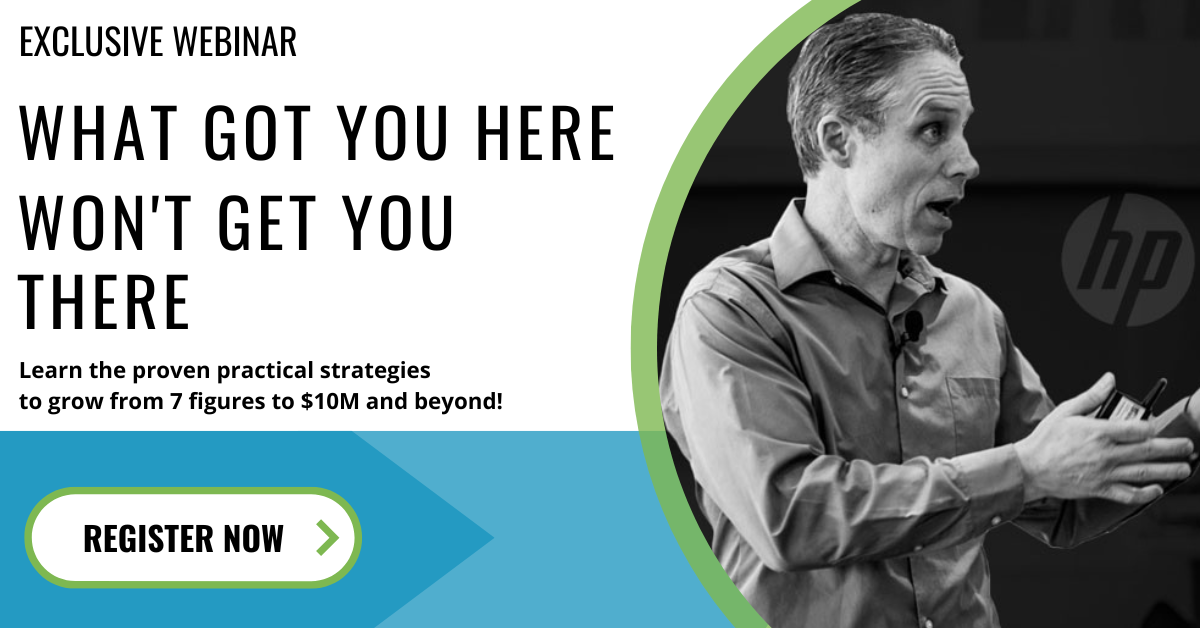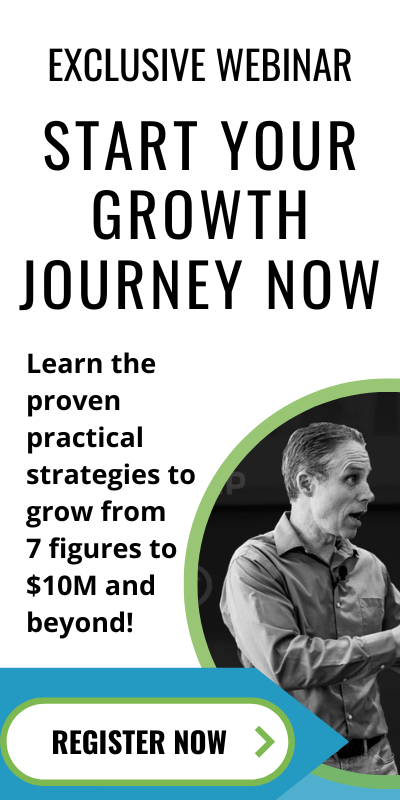Episode 153: Surrounding Yourself With The Right Talents With Mac Lackey
For a business to achieve its set goals, it requires the right talents to run the operations and provide sensible advice to its leaders. Mac Lackey took this to heart and became his critical factor in achieving success. In this conversation with Brett Gilliland, he shares how he started his business with his friends, got through numerous challenges, and learned the importance of hiring people who are way smarter and more skilled than him. He explains how surrounding yourself with excellence allows you to perform better in leading, inspiring, and coaching your team. Mac also discusses how to bring genuine value to your business in the simplest way, which results in a more profitable exit strategy.
—
Watch the episode here
Listen to the podcast here
I’m thrilled that I get to introduce yet another amazing guest. We’re bringing people on here who have been where you’re trying to get. They have real lessons learned and they get to share some of their amazing experiences in their own entrepreneurial journeys. I get to introduce you to Mac Lackey. Mac is an American entrepreneur who has started, scaled, and sold six companies. Mac and his companies have been featured on CNN, The Wall Street Journal, Fast Company, Business North Carolina, USA Today, and The New York Times. He’s been there, done that, as it were. He’s involved in soccer in Spain. He’s joining us from Spain, where he has a soccer team. I’ll let him say more about that. Welcome, Mac. Thanks for coming to the show.
Thanks so much for having me. I’m excited to be here.
Tell us a little bit about what you’re doing in Spain, and then we’ll get into some of your lessons as an entrepreneur.
I used to describe my life as existing in two big buckets. Bucket number one was my upbringing in youth. Every part of that journey was about soccer. I started playing soccer when I was about four years old. I fell in love with it early. I played my whole life, played through college, and played professionally. All of my life’s goals and dreams were soccer-related. After I stopped playing, I became an entrepreneur and started my first company. In the first quarter of 1995, right after Netscape launched the commercial web browser, I launched an internet company.
Those two buckets existed separately. Some of my companies were soccer-related. I continued to go back to that theme because I had a passion for it, but then, later in life, one of my bucket list opportunities was to buy a professional soccer team. In 2022, we acquired a team in Southern Spain, which has been a fun journey thus far. My wife and I decided to move to Barcelona part-time so it would be easier for me to get back and forth to the team. Plus, Barcelona’s an amazing city.
It’s not bad to hang out in Barcelona every year for however many months you do that. That’s amazing. You’re a serial entrepreneur. That term gets thrown around quite a bit, but you’ve started and sold many companies. As you think back on your experience and knowing that this show is focused on going from that early seven figures to beyond, there’s a common sticking point or a set of scaling challenges that happen to most businesses regardless of the industry or business model. If they’re going to grow with a team of people, there’s some complexity that starts to build and it hangs a lot of entrepreneurs up.
You’ve done this multiple times. I’d love to have you reminisce with us a little bit on the first time you hit that seven-figure mark and experience some of those stalling things that happened where you’re like, “Wait a minute. We were growing and now we’re starting to get stuck a little bit.” I don’t know if you remember much about that, but I’d love to have your comment.
I remember so many of them like they were yesterday. I look back on my career as an entrepreneur, of course, it was an amazing journey in so many ways and rewarding on so many levels. Certainly, with its challenges and lots of mistakes that I made in our first company, we started in our mid-twenties. That was our first entrepreneurial venture. I did not have a tech background, and we were starting a tech company. We had a partner who was a self-taught engineer, a very talented guy. We were learning as we were going. We also had this amazing timing because our macro thesis was the internet was going to change everything.
In hindsight, that’s so obvious, but at the time, I had a lot of smart people telling me I was crazy and I was wasting my time. We had the benefit of the growth of the internet, which fueled a lot of our opportunities. The reality is, when the business went from an idea or a startup on a sheet of paper effectively to ten-plus employees, Fortune 500 clients, and millions in revenue all very quickly, it was drinking from a fire hose.
With the benefit of hindsight, I would say the biggest thing that we missed early on was we hired our friends. We hired people whom we knew that we trusted, were close to us, and we could convince maybe to leave a good job and to take risks with us. Of course, those people were amazing to work with, but in many cases, it amplified the fact that we, as founders, did not have experience. We hired people to run sales who didn’t have experience and people to run engineering who were just getting started in their tech journey.
Some of the biggest challenges we had as a company was a lack of experience. I think you said it in the intro, I tell people all the time now, when you hire for a role, you want to hire someone who’s already been where you’re trying to go, ideally more than once. If you’re trying to build a sales organization, you don’t want to hire a good salesperson. You want to hire someone who has already built successfully a sales organization. We didn’t do that at all.
When you hire for a role, you want to find someone who's already been where you're trying to go, ideally more than once. Click To TweetWe had a lot of learning on the job and lots of mistakes, but because of some of the macro decisions we made. Ultimately, it worked out well. We had an eight-figure exit in our twenties and set the foundation for a career as an entrepreneur. I fell in love with the high growth aspects. I fell in love with building things. All of those were highly reinforced, but we certainly had our struggles navigating to the first outcome.
Listening to you describe hiring friends and family, people who are close to you that you knew is a common thing that happens for entrepreneurs. I’d love to dig into that a little bit more. When you realize that these people haven’t ever done what we’re trying to do. We haven’t, as founders, but now that’s compounded by the fact that the people we’re surrounding ourselves haven’t done it either.
That doesn’t necessarily mean failure. It doesn’t necessarily mean disaster. You guys still moved forward, but maybe unpack for us a little bit some of the things that had to happen for you to move forward. Did you end up going outside and bringing in proven people? Did you fumble along the way with your band of brothers, as it were, and figure it out as you go?
It was a key learning moment for us because we did have to go outside and find some experts. One of the things that I’m so thankful I did early in my career is I had to get over the ego of hiring people who were more qualified, smarter, and more pedigreed than I was. Here I am, the Founder and CEO. I have to go out and hire people who are older, more experienced, smarter, and went to the right schools, none of the things that I could say. That became a very repeatable and critical success factor for me. To the point that mid to late career, I used to say my only job as a founder was finding people smarter and better than me to sit at the table. That’s what I did.
I learned that. It served us incredibly well. It was uncomfortable because sometimes we had people who knew a lot of things that we didn’t. It was an awkward moment. We were also young. As I said, it became a critical success factor that I repeated for every subsequent business and every venture. Everything I’ve done ever since then has been on that idea that I have to surround myself with people who have already been there, are experienced, thoughtful, and know what they’re doing. I have to be okay that they know more about a certain subject than I do. I’m perfectly happy with that.
It sounds like a super important lesson for you to learn, and it’s good that you learned it early on and served you multiple times. I want our audience to tune into that. You repeated it, but those people who have been where you’re trying to go bring a lot of value to you when you’re trying to figure things out.
Early on, entrepreneurs are scrappy, they learn things. They’re like, “We have to figure out how to generate leads consistently. We have to figure out how to fulfill this thing at a higher scale more consistently in a repeated sort of fashion. They’re good at figuring out the operational things, but it seems like once we get into, “Now, we have to build this thing and scale this thing.” Some been there, done that know-how is helpful.
It’s a shortcut to so much of the scale challenge that almost every business faces in some form or fashion. What I mean by that is part of it is who you hire. Of course, there are people who already have that experience. In the case that you’re a resource-constrained, early-stage, high-growth company, startup, or whatever the definition would be, sometimes you don’t have the money to go hire someone who’s come out of Anderson Consulting and has ten years’ experience.
In my case, a lot of what we started to do is surround ourselves with advisors and mentors who fit that same bucket of a successful been there, done that individual that we could lean on for guidance so that we didn’t have to figure it out the hard way. I’ve designed so much in my life around that. These days, to me, it’s masterminds. I’m still very focused.

Right Talents: Surround yourself with advisors and mentors who fit that same bucket of a successful “been-there-done-that” that you could lean on for guidance so that you don’t have to figure everything out the hard way.
I own the soccer team, but I have a program trying to help founders create their first exit. Every part of that business, like talking about exits, is my life. I’ve done it my whole life, but how to find customers online and do lead gen in a new market, that’s not something I’ve done. I have to have an expert that I can lean on and say, “I don’t want to figure this out the hard way. Tell me exactly what I need to do. Tell me exactly how to build this.” I think that’s a formula that even early-stage just hitting seven-figure businesses that don’t have the money can still build an impressive aligned board of advisors or mentors to the founders and entrepreneurs. That can have the exact same impact without outlaying the dollars.
I don’t want this to be a leading question, but I’ve found in talking with entrepreneurs that getting that experience is super valuable. Did you ever experience a situation where the person you were looking to for guidance was too far down the path? The stage of business that they were well-acquainted with and that you wanted to be at was 2 or 3 stages beyond it, but they didn’t know how to relate well to the stage you were in and helped you guys at that stage. Did you ever experience that?
Yeah, as a matter of fact, it continues to happen to this day. I think about our soccer club. It’s a 114-year-old club that we acquired. It has an incredibly long history, but in a lot of ways, I still think of it as a startup because we’re doing a lot of things for the first time. We’re trying to bring a lot of innovations. We had an opportunity to present some vision to the city council. I went to someone I respect who has done these massive projects for sports teams, stadiums, and multi-billion dollar organizations. I asked for some guidance.
We had this opportunity with our club to present to the local city council about our vision for the stadium and the area. I went to someone who’s an advisor and said, “We have this opportunity.” I know he works with multi-billion dollar sports franchises. He had great advice and insights, but they were spending $15,000 on the videos, which would’ve exceeded our budget for the whole project. That was just to present it.
A lot of the larger organizations are used to having unlimited resources. Capital, teammates or people they can assign to do things, whereas an early-stage company may have 10 employees, and everyone’s wearing 3 or 4 hats. You can’t have a dedicated full-time person to work on one specific thing. Over the years, I’ve tried to recognize where there’s a misalignment in terms of guidance or strategy and say, “The idea is right. What’s the other way we could achieve it?”
The example I just gave you, literally, I thought he had brilliant ideas about 3D videos and illustrations. We didn’t have the budget to do that, certainly at the level that he was suggesting. I went to some online resources, spent about $1,000, got some beautiful illustrations done, and a short intro video, all for $1,000. We achieved the objective but with the mindset of a startup. I still think even those who are a little bit far removed from a 7 or 8-figure business can give you valuable advice. You have to turn down the expectation of what’s the reality of our resources and budgets.
It’s like you have to right-size the wisdom that they’re sharing. As I think about all the business owners that I’ve interviewed or that I’ve worked with, there are patterns that they start to recognize. They’re like, “This is a key thing that I must always do in this situation.” If I could guide your thinking more towards your own development as a leader because I think there’s a transition that happens from entrepreneur to confident CEO, there’s a shift there. Also, anything in the business had to change, whether there were some structure or processes that you had to put in place that a smaller company didn’t have to have. In order to scale, we had to build some things to be able to do this at a larger scale.
For me, a few things come to mind very quickly because I think every business at some level, unless it’s a solopreneur, is about people. We talked about hiring the right people earlier. Part of that for a lot of entrepreneurs and founders is also critically looking in the mirror and saying, “What am I truly good at? Where’s my contribution to the business?” Stereotypical entrepreneur in the critical path of everything. Product design, sales, customer service, answering phone calls, and taking out the garbage. The reality is there are 2 or 3 things out of the list of 1,000 that I personally do well and I think I’m probably better than most of my peers at. That’s it.
I need to get most of my time allocated to that to help the organization. I need to realistically look around me and say the same thing has to happen with co-founders, leaders, and VPs. They have to lean into those 2 or 3 things they do well, and the other things have to be off their plate. For me, that became obvious pretty early on. I was quick to delegate and get things off my plate so I could focus on what I think I’m good at. I’ve watched and advised a lot of entrepreneurs who are hanging on for dear life to things that are not their skillset and pretty much hamper the ability to scale because, again, no business can scale with the founder and the critical path of everything. One is that.
The second thing that I think is important is I used to always say, “Great products don’t win. Great products with awesome distribution wins.” How you get something to the market, whether it’s a product or a service, I realized, looking back over my career, a lot of what made us successful is finding a high-level or catalytic relationship that took our product to the market.
Great products don't win. Great products with awesome distribution wins. Click To TweetNot me hiring incremental more salespeople or more people doing marketing, but saying, “Who is the one company that if we partner with them, they could automatically get us to the market?” That distribution was probably the biggest thing outside of people that led to scale for us across multiple companies. Even when thinking about a new idea or advising someone on an early-stage company, I’m always looking for, “Where’s that leveraged distribution opportunity?”
The last thing, which is very much what I’ve been doing over the last 3 or 4 years which is when I look back over my own companies and I take the time to think about what went well and what mistakes I made. I found this common thread that was surprising to me. It was a point in time in every one of those six companies that I sold where things started to change, including scale. You could see the scale happening. It was interestingly when we started to look at our company through the lens of a prospective buyer. We maybe weren’t necessarily going to sell our company. Maybe we were going to raise money, maybe we were going to try to sell it.
However, the minute we started to look at our business and say, “What would a prospective buyer think about this? Is this a good product to launch? Is this a good new hire? Should I sign this lease or not?” That lens became so clarifying for us. It wasn’t the only decision, but it was one of the things that we started consistently asking. A lot of what I do in my Exit DNA program is helping companies create that option to exit in the future.
As you start to do that, all these other things start to happen. You inherently create more scale because things like the founder can’t be involved in the critical path. Nobody wants to buy a business where the founder does everything. It’s good for exit, but it’s also good for scale, and it helps the personal freedom of the founder. That’s been the super strategy. It’s like helping founders and entrepreneurs look at their business from the outside through the eyes of a prospective buyer, which has been a big part of what made a lot of our companies scale before we ultimately decided to sell them.

Right Talents: The founder can’t be involved in the critical path. Nobody wants to buy a business where the founder does everything.
I’ve done a lot of interviews, Mac, but I don’t think anybody else has ever mentioned that. I want to highlight it and call it out because I think it’s genius and simple. Who doesn’t like something that’s simple but so impactful? Lots of us, rightfully so, focus on that client journey or that customer experience. We’re always looking at our business, the fulfillment process, or the product through the eyes of the customer, and that is so helpful.
Putting that lens of a prospective buyer on the machine that creates that experience is so clarifying. That’s the word you used. I loved it. Clarifying. How would they perceive what we’re doing here if they were the buyer? What would they think of this decision? Would this add value to the business overall? Would it take away from it? That’s so good. Thank you for sharing that with us.
I agree with you. I’m often looking for what’s simple but adds value. I don’t like complex formulas or things that require a lot of thinking. I like simple and clarifying, and that’s been a big one for me.
That’s hugely valuable. I wish I could somehow highlight it in all of our show episodes. Like, “This one truth right here is me.” I skipped right over the leverage distribution. That’s genius as well, but I just liked that perspective of, “What would a buyer think of this?” Not the customer but the buyer of the business. A lot of our people will say, “I’m not looking to exit.” That’s not the point. Does your outside perspective see this as benefiting the business, hurting the business, or as neutral? Where do we want to be spending our time and energy?
I think it’s important for entrepreneurs and founders. I say this mostly every day of my life, what you want is the option to exit. If you have the option where people want to buy your business and they want to pay a lot of money for it, everything short of that is now available to you. If you say, “I don’t want to sell it, but I’d like to raise growth equity, or I’d like to bring in a big strategic partner, or I’d like to do a joint venture, or I’d like to recapitalize and take some chips off the table.” If you’ve designed your business to have the option to sell it, all of those other things are now available to you.
It’s a clarifying way to look at your business. The more you turn those dials to get it ready, the more you’ve created optionality, which I think as an entrepreneur, that’s the biggest thing we want. We don’t ever want to be forced to sell it. We want the option. We may never exercise it. We may just decide to keep this well-oiled machine that we’ve created. That’s a great decision. If you haven’t created the option to exit, you haven’t given yourself all of the variables and opportunities available to you.
Mac, we could talk for a long time. At least I could listen to your lessons learned for a long time. As we go to wrap up here, people are going to be interested in what you mentioned, Exit DNA. You could say more about that. I’m sure they would also love to connect with you on social or wherever you would direct them. How might people learn more about what you’re doing or how to connect with you?
Thank you. ExitDNA.com, you can read a little bit about what we do. There also is a now free eBook that I recommend if every one of your audience considers it. It’s ExitDNA.com/Book. It’s basically the four critical shifts that you need to make to create this optionality for your business. It’s now free. I used to sell it, it’s now given away for free. Personally, I have a site, MacLackey.com, and the same on all the social socials, @MacLackey. I’m happy to interact and help any of your audience that I can.
Thanks again for making time on a beautiful afternoon in Barcelona for you. It was great to get to know you. Thanks for being here.
Thanks so much for having me.
For everybody out there, please continue to like, share, and subscribe so that we can help as many 7-figure business owners as possible grow through these early 7-figure challenges that stick many of us. We want to help many people get the freedom from their businesses in their life that they’re looking for. Thanks for tuning in. We’ll see you next time.
Important Links
- Mac Lackey
- Exit DNA
- ExitDNA.com/Book
- @MacLackey – Instagram
- Facebook – Mac Lackey
- LinkedIn – Mac Lackey
About Mac Lackey
 Mac Lackey is an American entrepreneur who has started, scaled and sold six companies (all seven or eight figure exits). Mac and his companies have been featured on CNN, The Wall Street Journal, Fast Company, Business North Carolina, USA Today and The New York Times. Notable ventures include: KYCK (acquired by NBC Sports), Mountain Khakis (acquired by Remington) and InternetSoccer Network (acquired by division of News Corp/Sky). He additionally served as a member of the Board of Directors for Lending Tree (NASDAQ: TREE) for over five years and is currently an angel investor in over 50 companies. Mac is the owner of Spanish soccer team Algeciras Club de Futbol.
Mac Lackey is an American entrepreneur who has started, scaled and sold six companies (all seven or eight figure exits). Mac and his companies have been featured on CNN, The Wall Street Journal, Fast Company, Business North Carolina, USA Today and The New York Times. Notable ventures include: KYCK (acquired by NBC Sports), Mountain Khakis (acquired by Remington) and InternetSoccer Network (acquired by division of News Corp/Sky). He additionally served as a member of the Board of Directors for Lending Tree (NASDAQ: TREE) for over five years and is currently an angel investor in over 50 companies. Mac is the owner of Spanish soccer team Algeciras Club de Futbol.
Want to listen to more? View all episodes here >



